Text
pleaaaaaase y'all the process of having a manufacturing facility declared kosher has nothing to do with a rabbi blessing the food
pleaaaaaaaaaaaaaaaaaaaaase stop
you can literally google what is required
54K notes
·
View notes
Text
Passover Gothic
The grocery store in the goyish neighborhood is overflowing with matzah. Every shelf is full of matzah. There is matzah spilling out of the front door. You ask to buy the matzah. The cashier does not know what matzah is. You gesture towards the shelves, but they stare on, unseeing, and ask you to please finish your transaction.
Your child takes the candle, the feather, and the spoon from your hand. You have not yet lit the candle, but it is glowing anyway. They locate the crumbs with uncanny speed, but they are not where you placed them. Nothing is where you placed it. You just finished cleaning, but the entire house has rearranged itself.
The youngest child begins to sing the Four Questions. As she opens her mouth, the voice of your oldest child rings out. Your oldest child is an adult and hosting her own seder in Queens. No one else notices.
You begin to pour out wine for the plagues. “Dam”, you say. The smell of iron is in the air. All of your guests are staring straight ahead, unblinking, chanting “Dam” repeatedly under their breath. There are no other plagues. There is only blood.
You’re on the third verse of Dayenu. The fifth. The twelfth. The nineteenth? Does Dayenu have this many verses? Have you restarted? It keeps getting faster. You can’t understand the words anymore, but the children continue, their mouths moving at inhuman speed. You speak to tell them that this is enough, but the only word that comes out is “dayenu”. You cannot stop them.
You open the door to let in Elijah. You return to the cup, and it is empty. A smile spreads across your face. The time of the Messiah is upon us. You open your mouth to sing Siman Tov. The words come out backwards, and the cup begins to fill with wine.
The search for the afikomen begins. Quickly, your oldest child returns with half the middle matzah. Then your middle child. Then your youngest child. Each piece is identical, and all the boxes of matzah were empty. Each child demands the sum total of the reward. You look on helplessly.
The Hebrew on the back of the box of macaroons says they are pareve. The English states they are not kosher for Passover. You read them again. The Hebrew on the back of the box of macaroons says they are not kosher for Pesach. The English states they are pareve. You place the macaroons back on the shelf.
Day five of Passover. It feels as if you have not eaten chametz in years. You long for the taste of bread. You go to sleep, praying the days to pass quickly. You wake up. It is day five of Passover.
2K notes
·
View notes
Text
It’s easy to forget that everything that’s happening in Palestine is a result of European colonialism, centuries of European antisemitism, and Europe’s inability to answer its ‘Jewish question’
The ‘Jewish question’ was never a Palestinian or an Arab one, but a European one. Instead of Europe ‘answering’ it, by giving their Jewish populations their fair and equal rights and ending their centuries of antisemitism, they just simply tossed it onto the Middle East through lending it a very European tool; which is settler colonialism.
Europe found its ‘answer’ (or it didn’t) by simply letting someone else try to figure out the ‘answer’ and in the process sending a whole region into decades of chaos, and destabilization.
Every person who advocates themselves for the Palestinian cause must be fully aware that Zionism is fueled by antisemitism, and antisemitism empowers it. So let’s not act surprised when we see white supremacist and right-wing groups declare their love and support for Israel, because simply to them it’s the answer to their antisemitism and hatred for the Jewish people.
19K notes
·
View notes
Link
some lovely writing & resources on Jewish plant magic, by local (to me) queer Jewish witch Dori Midnight! hoping we get to meet sometime.
354 notes
·
View notes
Link
Originating from a broad range of geographic and chronological contexts, these texts, many of them appearing for the first time in English, offer the reader a broad vision of what it has meant to be a queer Jew throughout history — even in contexts where queerness has traditionally been assumed absent. Academic and lay readers alike will discover an astonishing variety of personal stories, poems, and midrashim in the anthology… I have been following the project since Noam first decided to publish it as a book — and was delighted to discuss it with him in more depth…
SL: What are your hopes for the book now that it’s been published?
NS: There’s almost no area of the Jewish world or aspect of Jewish life that is not touched upon in some way in the book — rabbinic literature, Hebrew poetry, Jewish immigration, secularization, modernization, and the development of the field of sexology. I really want other scholars to run with all of those different directions. The hope I have moving forward is that more people will be able to open up these historical fields.
There’s definitely more academic work to be produced from the book. About a third of the material in the book has never been published in English translation. Some material, sourced from archives, appears in this book for the very first time.
One reason why I chose to publish it with a trade press rather than an academic press is because I also wanted it to have a wider audience than just academics. I wanted a high school, even middle school, student to be able to read it, and I very consciously tried to write in a way that was accessible to laypeople. I’m excited to see the book serve as a resource for nonacademics: artists, filmmakers, playwrights, graphic novelists and people who are doing other kinds of Jewish programming. The stories included in this book could make wonderful plays, art installations, documentary films, comic books and graphic novels, children’s books, et cetera. I’m not the person to do that, but I’m really excited to put out the raw material for other people to work with.
SL: There’s a lot of talk right now among Jewish authors about what is out there for young readers that represents the full spectrum of Jewish experiences.
NS: It’s so rich and so much of it is unknown, and so really this book is an excuse to get people to read primary sources from Jewish history. If the fact that it’s about lesbians or about cross-dressing stowaways or about Yeshiva students sleeping with each other gets people excited to read that, great — but what’s equally exciting to me is that this might be a conduit for someone to learning about Jewish life in the Ottoman Empire, or life in colonial Brazil, or in medieval Iraq.
The intent of this book is to broaden the horizon of Jewish history — in terms of sexuality, gender, temporality, and location. I think people might be surprised to discover just how many areas of Jewish life can be enriched through the incorporation of these marginalized voices.
413 notes
·
View notes
Text
31 Days of Spiritual Journaling
Prompts for spiritual journals, grimoires, books of shadows… I hope this can provide inspiration! Please tag me or, tag the post “31 days of spiritual journaling”. I would love to see them!
What do you believe?
How did you come to your path? (your spiritual journey)
Teach/Describe one of your key spiritual practices. (mindfulness, meditation, grounding, prayer, ritual…….)
Discuss a plant or place that is important to you spiritually. Why is it meaningful to you?
Record a recipe relating to a holiday you celebrate. How do you use this food/drink/mixture?
Delve into your relationship with a deity, or why you don’t honor deities.
Teach/Describe a craft or skill that‘s tied to your spirituality.
Recommend 3 books!
What do you do when it is hard to continue your spiritual practice or feel connected spiritually?
Discuss offerings. What does that look like for you?
Engage with the theme of “sacrifice” What does that mean to you?
Delve into “Afterlife” or “Ancestors”. How do those ideas play out in your worldview? In your spiritual practice?
Have you had experiences meeting or working with other pagans/witches? Elaborate!
Discuss imagery or symbols that are important to you. What are they? Why are they important? How do you use them?
Make a ‘beginners guide’ or ‘field guide’ for an important element of your practice (stones, weather, herbs, gardening, tarot, camping…)
Engage with the theme of “love” What does that mean to you?
Take notes on a book, article, video, or guide about something you’d like to do soon.
Did you have experience being pagan/witchy in school? Advice for kids who grow up in a pagan/witchy home?
What are your core values? Challenge yourself to list them and explain your choices. (Need help? get started by looking at formalized lists like Catholicism’s 7 Heavenly Virtues, the Wiccan Rede, The Nine Noble Virtues, the 7 Principles of Unitarian Universalism…)
Create a page just for Gratitude Journaling. Does “gratitude” have a role in your practice?
Record quotes that are deeply meaningful for you.
Has there been a time your beliefs (pagan, pre-pagan, other…) have been deeply challenged? What was that like? What did you learn?
Are there any songs you find spiritually meaningful currently?
How would you describe yourself? Perhaps attempt a self-portrait. How have your self-views impacted or been changed by your spirituality?
Describe an intensely spiritual experience you’ve had.
Advice to New Pagans/Witches: What is a mistake you made, or a unnecessary challenge you faced, which you wish you’d been able to avoid?
What does the theme of “courage” mean in your path?
What is your dream home, future-self, or vacation? Can you identify aspects of your spirituality that impact that dream of yours?
Record a dream. Do you find any meaning or significance in it?
Do you have any experiences with tarot/runes/divination? What are your beliefs around that? If you enjoy divinatory work, do you have a theory regarding how/why it works?
If someone was to honor you as their ancestor, what would be a meaningful and loving way for them to do that?
6K notes
·
View notes
Text
I found this gem today.
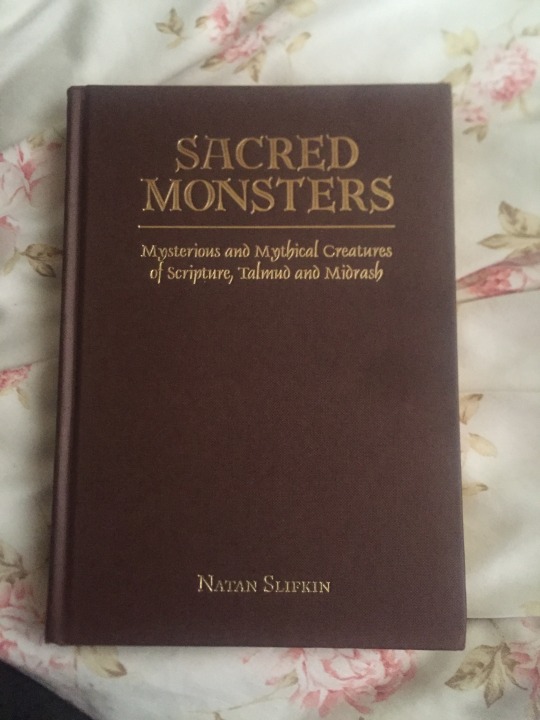
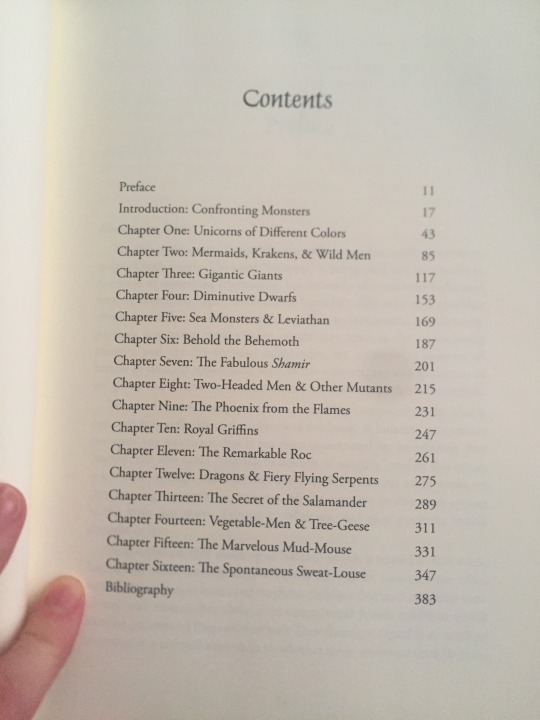
TBH this is a good day.
367 notes
·
View notes
Text
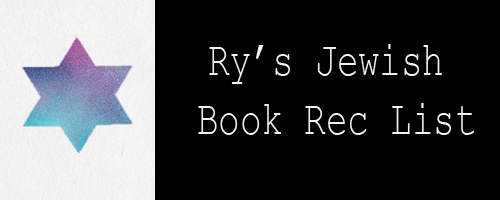
I’d been meaning to make a rec list for a while, but now I’m finally getting around to it! I’ve read or started to read most of the books on this list, and I own 95% of them. If I haven’t read it, but someone has recommended it to me, I’ve included it. I know that there are books I’ve read or have been meaning to read that aren’t on here because my memory is shit and I never write anything down. Titles link to Goodreads.
An asterisk (*) indicates a book I haven’t read yet. A pound sign (#) indicates a book I haven’t read yet, but which others have recommended. A tilde (~) indicates a book I’m in the process of reading and would recommend up to the current point (aka “I don’t know if this book has a terrible second half, but so far it’s good”). Italics indicate a personal favorite.
Fiction:
Tevye the Dairyman and the Railroad Stories by Sholem Aleichem
The Brothers Ashkenazi by Israel J. Singer *
The Golden Dreydl by Ellen Kushner
Everything Is Illuminated by Jonathan Safran Foer
The Ghost Writer by Philip Roth #
The Amazing Adventures of Kavalier & Clay by Michael Chabon ~
My Name is Asher Lev by Chaim Potok #
The Instructions by Adam Levin
The Red Tent by Anita Diamant #
The Second Mango by Shira Glassman
The Rabbi’s Cat by Joann Sfar
The Mathematician’s Shiva by Stuart Rojstaczer ~
This Is Where I Leave You by Jonathan Tropper (I might not have included this one except that a friend whose opinion I trust absolutely loved it.)
The History of Love by Nicole Krauss #
The Doverkeepers by Alice Hoffman *
People of the Book by Geraldine Brooks *
The Golem and the Jinni by Helene Wecker #
The Frozen Rabbi by Steve Stern *
Friday, the Rabbi Slept Late by Harry Kemelman
Hereville: How Mirka Got Her Sword by Barry Deutsch
The Family Moskat by Isaac Bashevis Singer #
Moving Waters by Racelle Rosett *
The World to Come by Dara Horn
Maus: My Father Bleeds History by Art Spiegleman (Shoah tw)
Nonfiction:
The Great Latke-Hamantash Debate by Ruth Fredman Cernea
Boychiks In the Hood: Travels in the Hasidic Underground by Robert Eisenberg
The Jewish Body by Melvin Konner
The Year of Living Biblically: One Man’s Humble Quest to Follow the Bible as Literally as Possible by A.J. Jacobs (Jacobs is Jewish, but spends half the book following Jewish traditions and the other half following Christian traditions, just as a note.)
Living a Jewish Life by Anita Diamant (also would rec “Choosing a Jewish Life” for converts, etc)
Gonzo Judaism: a Bold Path for Renewing an Ancient Faith by Niles Goldstein
New American Haggadah edited by Jonathan Safran Foer (lovely design and dual translation)
Kosher Chinese: Living, Teaching, and Eating with China’s Other Billion by Michael Levy
O Jerusalem! Day By Day and Minute By Minute, the Historic Struggle For Jerusalem and the Birth of Israel by Larry Collins and Dominique Lapierre #
Inside Israel: The Faiths, the People, and the Modern Conflicts of the World’s Holiest Land by John Miller and Aaron Kenedi #
The Receiving: Reclaiming Jewish Women’s Wisdom by Rabbi Tirzah Firestone ~
The Rabbi’s Daughter by Reva Mann #
Daughters of the King: Women and the Synagogue by Susan Grossman ~
Tough Jews: Fathers, Sons, and Gangster Dreams by Rich Cohen #
25 Questions for a Jewish Mother by Judy Gold and Kate Moira Ryan
The Sabbath by Abraham Joshua Heschel
Hillel: If Not Now, When? by Joseph Telushkin
1000 Mitzvahs: How Small Acts of Kindness Can Heal, Inspire, and Change Your Life by Linda Cohen
Mornings and Mourning: A Kaddish Journal by E.M. Broner
My Grandfather’s Blessings: Stories of Strength, Refuge, and Belonging by Rachael Naomi Remen
Jewish Literacy by Joseph Telushkin (this is more of a “skim when you want to” kind of resource book, rather than a narrative.)
Born to Kvetch: Yidish Language and Culture in All of Its Moods by Michael Wex *
The Defiant Muse: Hebrew Feminist Poems From Antiquity to the Present by Shirley Kaufman
The Scattered Tribe: Traveling the Diaspora from Cuba to India to Tahiti & Beyond by Ben G. Frank #
Cosmopolitans: A Social and Cultural History of the Jews of the San Francisco Bay Area by Fred Rosenbaum *
Blood Relation by Eric Konigsberg *
Up, Up, and Oy Vey! How Jewish History, Culture, and Values Shaped the Comic Book Superhero by Simcha Weinstein #
Mandarins, Jews, And Missionaries: Jewish Experience In The Chinese Empire by Michel Pollak *
The Hyena People: Ethiopian Jews in Christian Ethiopia by Hagar Salamon *
Cookbooks:
The Holiday Kosher Baker by Paula Shoyer
The Joy of Kosher by Jamie Geller (seriously, I have never made a recipe from this book and had it come out anything other than absolutely delicious)
Classic Italian Jewish Cooking by Edda Servi Machlin
The Foods of Israel Today by Joan Nathan
Feel free to add others!
Tagging shiraglassman and newlyjewly, re: the “books” ask.
2K notes
·
View notes
Link
About 10 years ago, Jason Lieberman stopped wearing tefillin. This was not an act of rebellion — Lieberman’s cerebral palsy simply made it too difficult for him to put them on.
Seven years later, Lieberman, 34, who serves as treasurer of Matan, which provides Jewish education programs to special needs children, sought help from his extensive network in the Jewish community: Where could he find an occupational therapist who had experience in training disabled Jews to put on their own tefillin?
The answers disappointed him. Two rabbis offered to give him a heter — a dispensation — so that he wouldn’t have to wear tefillin at all. Another suggested that he get someone else to put them on for him.
That was exactly what he was trying to avoid…
745 notes
·
View notes
Text
More convert advice no one asked for but that I’ll throw out there anyway:
Commit to listening only to Jewish music for the foreseeable future. It’ll really help both your Hebrew and your ability to intuit where a song you don’t know is going and/or where the line repeats are (because of course they aren’t marked lmao)
Make learning alef-bet a top priority, because the faster you can follow along with the Hebrew and wean yourself from the transliterations, the less frequently you’ll be lost. You don’t have to know the full words or their actual translations just yet - learn a few highly recognizable words and then keep up while people are reading/chanting by recognizing the first letter.
Davening (even just saying the morning and evening Shema) and working on the home rituals and the brachot will really help your Hebrew and ability to follow the liturgy in addition to being a good habit to get into.
Listen more than you talk. I know this is really hard as someone who nervous-talks, but just force yourself to accept some awkward silences and get really good at asking people questions.
Immerse yourself as much as possible. I mentioned this in the tags of that other post, but this is a lot more like acculturating than regular socializing, so diving in headfirst is actually a lot more helpful than tiptoeing in.
You’re gonna make awkward mistakes. It WILL happen. Most people won’t notice, won’t care, will do it themselves next time, and/or won’t remember. Learn to laugh at yourself.
Seriously everyone gets lost at least once or twice per service except That One Guy who’s been attending services every week for the last 80 years and just… don’t worry about him.
As my bestie taught me early on (and was 110% right about): Someone Is Always Later Than You
Corollary to the above point: Sometimes It Has To Be You And That’s OK
So like, not all rabbis are equally good with people, but please try to keep in mind that they usually have a LOT going on, especially around the holidays, and try not to take distance personally.
You don’t have to have a good voice or know the songs to sing along. Or, as one service leader said: “If you know the songs, sing along; if you don’t know them sing louder.” If you’re really hung up on it, sit next to someone who sings loudly off-key until you’re more confident.
If people offer you food and you are capable of eating it, eat the damn food!
Try to remember that most people are totally absorbed in their own lives and are not likely to remember that awkward thing you did or said. Really. Paranoia about this is more likely your anxiety biting you than based in reality.
Most people are nice (or nice enough) and want you to feel comfortable there.
On the other hand, if people really are being mean, you may want to find a way to mention it to your Rabbi.
If it’s a really bad fit, you may need to find another synagogue. Don’t be afraid to jump ship or branch out if you need to.
Hang tight - the culture shock won’t last forever, I promise!
1K notes
·
View notes
Text
@converts
converts who have already been in the mikveh, converts who are almost ready to make things official, converts in the middle of their journey, converts who are just now starting to study seriously: you are Amazing!!! we are amazing!! how crazy is it that despite not being born Jewish, not growing up Jewish, we’re Here and learning things and growing and changing!
if you grew up surrounded by a jewish community and always felt like you should be a part of it, or you have jewish family and are rediscovering your connections to the tribe, or you read a book or watched a movie about judaism and fell in love a little bit, or you learned about judaism in school and wanted to know more, or you stumbled upon it completely by chance and knew there was Something there for you
if you’re firm in your beliefs, or you have your doubts or and concerns and wrestle with your spirituality, or you’re an atheist or agnostic but you recognize the beauty and value in these ancient words and rituals and culture, whether you were raised in another faith or grew up without one
whatever your first language is, the color of your skin, your nationality, your race, your culture
if you’re struggling to increase your levels of observance, if you’re not able to go to a synagogue every weekend or you’re there 15 minutes early, if you’re working with one rabbi or you’ve met with ten, if your mouth has trouble fitting around hebrew or it comes naturally to you, if you sing along every friday or if you’re still learning the words to songs and prayers and stay quiet, if you’re waking up with the sunrise to go through morning prayers or barely remembering to stumble through the shema as you’re falling asleep, if your family and friends have welcomed your decision with open arms or if they’re confused or worried or angry
if you’re converting orthodox, reform or conservative, if you get more excited with every new holiday, if you’re dreading not having a christmas tree, if you’re working through the breakup of your love affair with bacon-wrapped shrimp, if you feel like you’re glowing the first time you’re invited to a shabbat dinner, if you’re wondering if you can join your school’s hillel, if you’re imagining what it will be like to stand under a chuppah someday, if you’re excited about the idea of someday helping your daughter prepare for her bat mitzvah, if you’re just starting to be confident enough to give your own opinions at torah study, if you’re struggling and singing and learning and studying and arguing and loving
stay strong! you are (or will be) an amazing addition to the tribe. you are enough. this is meant for you. keep on learning and doing. your experiences are just as authentic as anyone else’s, and you are (or will be) just as Jewish as anyone else.
“Dearer to G-d is the stranger who has come of their own accord than all the crowds of Israelites who stood before Mount Sinai. For had the Israelites not witnessed the thunder, lighting, quaking mountains and sounding trumpets, they may not have accepted the Torah. But the stranger, who saw not one of those things, came and offered themselves to the Holy One, and took the yoke of Heaven upon themselves. Can anyone be dearer to G-d than this person?”
(Tanhuma Buber, Lech L’cha, 6)
#my uncle's Judaism taught me openheartedness and love before I even knew Hashem's name#David I know you left our family years ago but I am grateful to you forever
2K notes
·
View notes
Text
To appreciate what we are actually doing when we pray, we have to examine what prayer really means. First, we have to understand that in Judaism we do not pray. Prayer is an English word. What Jews do is l’hispallel.
L’hispallel is a unique experience, but as with most Jewish things today, this holy word has been changed into an English word with a western connotation. The word “prayer” actually comes from the Latin word meaning “to beg” — exactly what most people feel prayer is. They imagine a big king in the sky who is getting a big ego boost from watching his subjects beg. This is a terrible image of our selves and of G-d.
L’hispallel has nothing to do with begging G-d to change His mind. L’hitpallel is a reflexive verb and it means to do something to your self, not to G-d. When you are praying, your question should not be, “Is G-d listening to my prayers?” For sure he is. What you should really ask yourself is, “Am I listening to my prayers? Does what I say impact me? Have I changed?”
If you are under the impression that praying is communicating to G-d information that He does not already know, then the whole prayer experience becomes ridiculous. G-d knows that your business is falling apart. G-d knows that you desperately want your soul-mate. G-d knows exactly what is going on in your life. L’hispallel is not about G-d hearing your prayer. It is about you hearing your prayers. You need to say these things to G-d not because He need to hear them but because you need to hear yourself saying them to G-d.
Rabbi David Aaron
1K notes
·
View notes
Text
Hi! I wanted to share something that might help others in their davening while they’re still conversion students.
As many of you probably know, one of the morning blessings is related to thanking Hashem for not making them a gentile (“…shelo asani goi”), or alternatively, for making them Jewish (“…she'asani yisrael.”) Now, clearly this could get a bit awkward for a convert to say, but is even more so for a conversion student.
That being the case, I looked for an existing alternative and couldn’t find anything for a long time. (I have subsequently discovered that completed converts are apparently supposed to say “….she'asani ger,” but I still like my version of it.)
What I came up with in the interim was “….who has called me to become Jewish,” which @progressivejudaism was kind enough to help me translate into “….asher kara li laasot yisrael.“
I don’t know if anyone else will find this useful, but I wanted to share in case someone did!
645 notes
·
View notes
Text
Fun fact: the anti-Semitic stereotypes about Jews having lots of money/being greedy/cheap began in the Middle Ages thanks to Christian laws.
The Christian church began forbidding Christians from having professions that involved lending money, banking, or pawn work. It was because the church believed that money was ultimately unclean so although it was considered a necessity, Christians were instructed to deal with it as little as possible.
But someone still needed to run all of those money-based businesses. So these societies which were already run by Christian leadership basically made it a rule that these businesses had to be run by Jews since they were already “unclean”. Furthermore, due to other restrictions on Jewish people in these areas, these money-based positions were pretty much some of the only jobs Jews could legally hold.
This eventually led to numerous stereotypes involving Jews and money. And the acidity of these stereotypes grew when Christian people and leaders became resentful of the livelihood Jews were able to achieve for themselves with these jobs.
So to sum up: Christian society forces Jews to hold down money-centered jobs since, according to the church, Jews were already going to Hell. Then, once they made lives with these roles they were forced into, Jews were mocked and hated for being successful.
38K notes
·
View notes
Text
I’m obsessed with Zsuzsa Ujj’s work. (sold under shop name Judaica Hungarica on Etsy and Modern Tribe)
Look at these!!!!

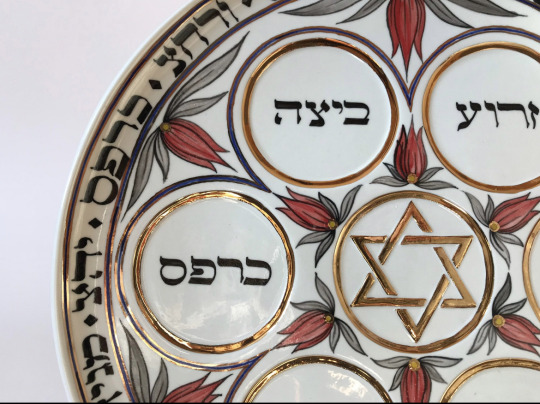


1K notes
·
View notes
Text

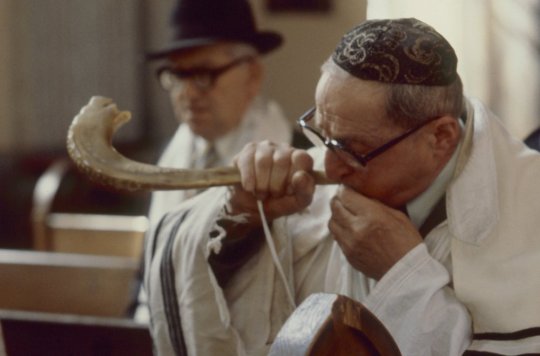



Laurence Salzmann, "I Remember Them Now" (The last Jews of Radauti, Romania, 1974)
805 notes
·
View notes